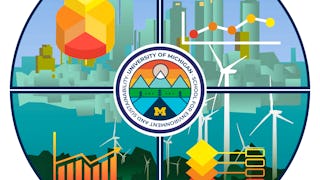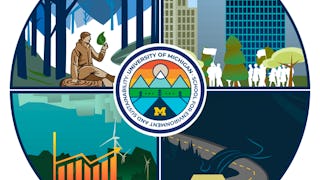Studies of the late twentieth and early twenty-first centuries demonstrated persistent trends in the US: race, income, and other factors predispose marginalized communities to higher toxic waste exposure and poorer quality of air, water, housing, and recreational spaces. In “Environmental Justice,” you’ll learn how these burdens have individual, interpersonal, and intergenerational effects and how environmental justice has helped mitigate these inequities



Environmental Justice
Dieser Kurs ist Teil von Spezialisierung Green Skills for a Sustainable and Just Future

Dozent: Rebecca Hardin
Bei  enthalten
enthalten
Empfohlene Erfahrung
Empfohlene Erfahrung
Was Sie lernen werden
Analyze current trends, events, and changes in the field of environmental justice using knowledge of the field’s history
Describe concepts and actions around the four types of justice as they relate to actions, organizations, and technologies
Contextualize environmental justice work in relation to histories of human inequality, adaptation, and resilience
Kompetenzen, die Sie erwerben
- Kategorie: Natural Resource Management
- Kategorie: Social Justice
- Kategorie: Environmental Policy
- Kategorie: Environmental Laws
- Kategorie: Diversity Equity and Inclusion Initiatives
- Kategorie: Environmental Issue
- Kategorie: Advocacy
- Kategorie: Community Development
- Kategorie: Environmental Regulations
- Kategorie: Research
- Kategorie: Policy Analysis
- Kategorie: Health Equity
Wichtige Details

Zu Ihrem LinkedIn-Profil hinzufügen
Dezember 2024
5 Aufgaben
Erfahren Sie, wie Mitarbeiter führender Unternehmen gefragte Kompetenzen erwerben.

Erweitern Sie Ihre Fachkenntnisse
- Lernen Sie neue Konzepte von Branchenexperten
- Gewinnen Sie ein Grundverständnis bestimmter Themen oder Tools
- Erwerben Sie berufsrelevante Kompetenzen durch praktische Projekte
- Erwerben Sie ein Berufszertifikat zur Vorlage


Erwerben Sie ein Karrierezertifikat.
Fügen Sie diese Qualifikation zur Ihrem LinkedIn-Profil oder Ihrem Lebenslauf hinzu.
Teilen Sie es in den sozialen Medien und in Ihrer Leistungsbeurteilung.

In diesem Kurs gibt es 6 Module
In this module, we'll talk specifically about how the Environmental Justice movement gained momentum through community responses to the distributive justice problem of inequitable siting of waste facilities in residential areas where nonwhite Americans live. We will discuss the uneven distribution of waste burdens, the "not in my back yard" or NIMBY movements that came together in response to create the wider EJ movement and field of study. We'll scrutinize the socio-environmental implications of waste management, the quest for fairer consumptive and recycling practices, and outline the intricate relationship between activism, research and teaching, policy, and the pursuit of environmental equity.
Das ist alles enthalten
8 Videos7 Lektüren1 Aufgabe2 Diskussionsthemen
In this module, we will explore the concept of Procedural Justice in the context of EJ, and its institutionalization. Focusing on both Energy Justice Systems, we will discuss decision-making, political contexts and implications for the built environment and human experience. What role does energy access play in achieving Environmental Justice goals? We will have interviews with energy specialists Tony Reames, Deputy Director for Energy Justice at the U.S. Department of Energy and Rahul Agrawal Bejarano, Project Manager and Data Analyst at the Energy Equity Project, to examine cases from their work and assess relevant legislative and policy frameworks. We will also discuss tools for practitioners to incorporate procedural justice principles.
Das ist alles enthalten
5 Videos6 Lektüren1 Aufgabe
We define Retributive Justice in relation to EJ, and and aspects of Infrastructural and legal Justice in US carceral and criminal systems that punish those committing harm, contrasting them with the practices currently in vigor vis a vis responsibilities and actions of corporations. We scrutinize punitive approaches, costs and environmental impacts of imprisonment, compared with processes of corporate accountability in light of social and environmental injustices. Through critical analysis, we will engage with the ethics and pragmatics of holding individuals and corporations to account.
Das ist alles enthalten
4 Videos4 Lektüren1 Aufgabe
Conceptualize the principles and practices of Restorative Justice as defined by the United Nations, and others, as they relate socially restorative practices in ever wider use to restoration ecology and its expansion at present. The module will not only consider the expanding use of restorative justice circles and related practices in households, schools, local communities and even entire nation states in post conflict settings, but will also consider the relationship between social justice process and the healing of environmental harms through ecological re-introductions and management.
Das ist alles enthalten
4 Videos5 Lektüren1 Aufgabe
This module discusses Reparative Justice, widely understood but still limited in practice. It also explores emergent justice frameworks, relying most on the frame of Relational Justice, an emerging term that captures a range of justice approaches that are less transactional or rooted in existing harms and more about harm prevention. We consider these practices in light of histories like slavery and colonial violence that undergird many modern nation states, and relate them to contemporary challenges for attaining climate justice. We review initiatives like the US "Justice 40" push to put funding for climate adaptation into frontline vulnerable communities, and explore their effectiveness in healing harms.
Das ist alles enthalten
5 Videos9 Lektüren1 Aufgabe
This module wraps up our course with a synthesis of the course and part 2 of the Interview with Paul Mohai. As a founding father of the EJ movement, it's fitting that our course began and is now ending with the Mohai interview.
Das ist alles enthalten
2 Videos1 Lektüre
Dozent

Mehr von Governance and Society entdecken


University of Michigan


Duke University


University of Michigan


The University of North Carolina at Chapel Hill
Warum entscheiden sich Menschen für Coursera für ihre Karriere?





Neue Karrieremöglichkeiten mit Coursera Plus
Unbegrenzter Zugang zu 10,000+ Weltklasse-Kursen, praktischen Projekten und berufsqualifizierenden Zertifikatsprogrammen - alles in Ihrem Abonnement enthalten
Bringen Sie Ihre Karriere mit einem Online-Abschluss voran.
Erwerben Sie einen Abschluss von erstklassigen Universitäten – 100 % online
Schließen Sie sich mehr als 3.400 Unternehmen in aller Welt an, die sich für Coursera for Business entschieden haben.
Schulen Sie Ihre Mitarbeiter*innen, um sich in der digitalen Wirtschaft zu behaupten.
Häufig gestellte Fragen
Access to lectures and assignments depends on your type of enrollment. If you take a course in audit mode, you will be able to see most course materials for free. To access graded assignments and to earn a Certificate, you will need to purchase the Certificate experience, during or after your audit. If you don't see the audit option:
The course may not offer an audit option. You can try a Free Trial instead, or apply for Financial Aid.
The course may offer 'Full Course, No Certificate' instead. This option lets you see all course materials, submit required assessments, and get a final grade. This also means that you will not be able to purchase a Certificate experience.
When you enroll in the course, you get access to all of the courses in the Specialization, and you earn a certificate when you complete the work. Your electronic Certificate will be added to your Accomplishments page - from there, you can print your Certificate or add it to your LinkedIn profile. If you only want to read and view the course content, you can audit the course for free.
If you subscribed, you get a 7-day free trial during which you can cancel at no penalty. After that, we don’t give refunds, but you can cancel your subscription at any time. See our full refund policy.
Weitere Fragen
Finanzielle Unterstützung verfügbar,

